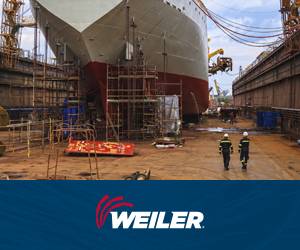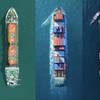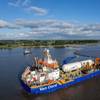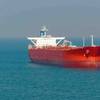The Coast Guard's May 10 proposal to add costly and prescriptive salvage and firefighting provisions to its tank vessel response plan regulations should be overhauled in favor of a simpler and more practical approach, AWO testified at a July 17 public meeting in Philadelphia, Pa. Jennifer Carpenter, AWO Senior Vice President-Government Affairs and Policy Analysis, summarized AWO's major
concerns regarding the proposal:
The need for the proposed rule has not been demonstrated. The Oil Pollution Act of 1990 is working well, both on the prevention and the response fronts. Tank barge spill volumes declined 92 percent between 1990 and 2000, and both the Coast Guard and the National
Academy of Sciences have acknowledged that spill response has been timely and effective since the passage of OPA 90.
"Quite simply, the Coast Guard has failed to demonstrate that this costly proposal is necessary to achieve the pollution prevention objectives of OPA 90," Carpenter said.
The proposed rule's highly prescriptive approach has no clear basis in casualty history or supporting documentation.
"The detailed performance standards specified in the notice of proposed rulemaking are artificial and arbitrary benchmarks more likely to be used to penalize planholders retrospectively than to materially improve the effectiveness of a response and salvage operation," AWO asserted.
The proposed rule would unfairly place the entire burden of supporting a massive national salvage and firefighting infrastructure on one segment of the maritime industry, despite the fact that the share of oil pollution attributable to tank vessels is steadily declining. In 2000, AWO noted, tank barges accounted for 9.3 percent of the oil entering U.S. waters - less than half the volume attributed to non-tank vessels (20.4 percent) or facilities (21.8 percent).
Ironically, the Coast Guard has cited the New Carissa casualty as an example of the need for enhanced U.S. salvage capability, despite the fact that that vessel was a freight ship that would not have been covered by the proposed requirements.
The proposed rule would place an unacceptable economic burden on tank vessel owners, especially small companies. The Coast Guard's estimate that most small businesses would suffer a revenue loss of five percent or less, and some small companies a five to 10 percent revenue loss, is "remarkably, and unacceptably, high for a rule that promises such marginal spill-reduction benefit," AWO stated.
AWO also expressed concern that the Coast Guard did not adequately consult planholders during the five-year process of developing the proposed rule.
Additional consultation with vessel owners prior to publication of the
NPRM would have produced a sounder regulatory proposal and, most likely, a shorter regulatory process in the end, AWO noted.
As an alternative, AWO urged the Coast Guard to return to the 24-hour planning standard it had planned to implement in 1998 but subsequently suspended. This standard is appropriate for all of the salvage capabilities listed in the proposed rule except heavy lift equipment, which need not be subject to specific time requirements, AWO proposed. On the more complex issue of firefighting, AWO urged the Coast Guard to convene a dialogue involving tank vessel owners, salvors, and firefighters to discuss further such issues as the appropriate role of public and private firefighting resources and their integration into an effective salvage operation.
AWO members Bruce Law, Allied Transportation Company; Dick Heym, K-Sea Transportation; and Kyle Watts, American Commercial Barge Line, LLC, supported Ms. Carpenter's remarks. The Philadelphia meeting was the second in a series of four planned public meetings on the proposed rule. Meetings were also held in Texas City, Texas, on
July 9, and in Seattle, Washington, on July 25. Formal announcement of a fourth public hearing - tentatively scheduled for September 19 in Louisville, Kentucky - is pending. The public comment period, now set to close August 8, will be extended to account for the additional public meeting.
Source: AWO Letter
Sponsored Content
Protect Your Crew. Exceed Weld Standards.

MSC Sets a New Standard for Time Off in 2025, Plus Earn a $44,345 Bonus as an Able Seaman!

August 2025
 Read the Magazine
Read the Magazine

 Read the Magazine
Read the Magazine
This issue sponsored by:

Hidden Threats at America’s Ports: Why Foreign-Made Cranes Pose Strategic Risk
Subscribe for
Maritime Reporter E-News
Maritime Reporter E-News is the maritime industry's largest circulation and most authoritative ENews Service, delivered to your Email five times per week








